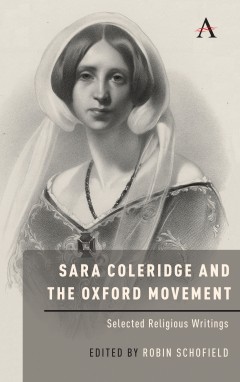Sara Coleridge and the Oxford Movement
Selected Religious Writings
By Robin Schofield
Other Formats Available:
E-Book- About This Book
- Reviews
- Author Information
- Series
- Table of Contents
- Links
- Podcasts
About This Book
‘Sara Coleridge and the Oxford Movement’ presents Sara Coleridge’s religious writings to modern readers for the first time. It includes extracts from her important religious works which have remained unpublished since the 1840s. These writings present a forthright and eloquent challenge to the patriarchal hegemonies of Victorian religion and society. They represent a bold intervention by a woman writer in the public spheres of academia and the Church, in the genre of religious writing which was a masculine preserve (as opposed to the genres of religious fiction and poetry). The religious writings published by Sara Coleridge in the 1840s present the most original and systematic critique of the Tractarian theology developed by John Henry Newman, Edward Pusey, John Keble and their colleagues. Sara Coleridge advances against a theology which she regards as repressive, authoritarian and conceptually flawed, a radical Protestant religion of inward experience and reason, underpinned by a Kantian epistemology. The passages reveal Sara Coleridge’s concerns with the language of religious discourse, which drove her later developments in religious prose.
‘Sara Coleridge and the Oxford Movement’ also consists of passages selected from Sara Coleridge’s unpublished masterpiece ‘Dialogues on Regeneration’ (the equivalent of her father’s ‘Opus Maximum’), written in the last two years of her life. This collection of Socratic dialogues is quite remarkable, the most original and innovative religious work of the Tractarian era. Sara Coleridge recognized that the form and language of religious discourse was an essential consideration in determining the character of religious culture. In the period from 1833 to 1850, the monologic forms of treatise, sermon, tract and essay had fostered dogmatic and immoderate styles of expression, which had created conflict and division. Sara Coleridge therefore adopted and developed a form in which opposing views could be heard as well as stated, and which could facilitate dialectical progression towards new understanding: a medium in which division could be resolved. Sara Coleridge’s innovative use of Socratic dialogue is associated with a new ambiguity in her approach to Tractarianism. Through one of her women characters, she presents the devotional and aesthetic ethos of Tractarianism, and its practical, pastoral concerns, with sympathetic sensitivity. The passages from ‘Dialogues on Regeneration’ reveal Sara Coleridge to be a religious writer and thinker of unique originality and range, profoundly sensitive to the pressing needs of her times.
Reviews
‘The volume carefully maps Coleridge’s imaginative and spiritual development through the influence of Wordsworth and Southey, Tractarianism and her eventual critique of Anglo-Catholicism, and her Kantian embrace of a practical rather than mystical Christianity. An outstanding scholarly edition of a profoundly infl uential but much neglected theological voice.’
—Emma Mason, Professor, Department of English and Comparative Literary Studies, University of Warwick, UK
‘This magnificent edition sheds new light on the controversies surrounding the Oxford Movement. Sara Coleridge’s literary gifts as well as philosophical erudition appear in her probing critique of the Tractarians and defence of her father, S. T. Coleridge. Her hitherto unpublished Dialogues on Regeneration, finely annotated in this book, is a major addition to the Victorian canon.’
—James Vigus, Senior Lecturer in English, Queen Mary University of London, UK
‘This excellent volume continues the retrieval of an important Victorian voice. Robin Schofield has gathered Sara Coleridge’s fugitive religious writings and a selection from her major unpublished manuscripts.’
—Peter Swaab, Professor of English Literature, UCL, UK
Author Information
Robin Schofield read English at Lincoln College, Oxford, UK, where he developed an abiding interest in Romantic literature and culture, with particular reference to the Wordsworth circle. A member of the Friends of Coleridge for twenty-fi ve years, Schofi eld became interested in the lives and work of Samuel Taylor Coleridge’s children, Hartley Coleridge and Sara Coleridge, particularly in the latter’s editorship of her father’s work. Schofi eld’s interest in C19 religion, especially the Oxford Movement, led him to study Sara Coleridge’s religious writings.
Series
Anthem Nineteenth-Century Series
Table of Contents
Preface; Abbreviations; Introduction: ‘Sara Coleridge and the Contexts of Religious Division’; Part 1: Selections from Religious Writings, 1843–1848; Section 1. ‘On Rationalism’; Section 2. Introduction to ‘Biographia Literaria (1847)’; Section 3. ‘Extracts from a New Treatise on Regeneration’; Part 2: Selections from Dialogues on Regeneration, 1850–1851; Section 1. Introductory Dialogues; Section 2. On the Incarnation of Our Lord Jesus Christ in Relation to Time; Section 3. Scriptural Dialogues; Section 4. On the Idea of Personality in Reference to Our Lord Jesus Christ; Bibliography; Index.
Links
Stay Updated
Information
Latest Tweets



